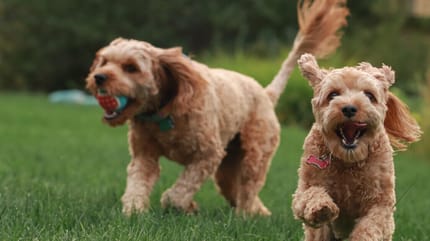Your dog’s parents and siblings were hugely important to them as pups but do they still remember them now? The answer isn't as straightforward as we'd like it to be.
Dogs are intelligent, empathetic creatures and while it’s highly unlikely that they’ll think, “oh there’s my sister, I grew up with her”, they may well view their siblings differently. Smell is incredibly important to dogs and they’re likely to recognise the scent of their canine family and feel happy and safe in their presence.
How can I tell if my dog recognises their dog sibling?
Look out for how your dog reacts to their sibling. If they smell them much more intently than they would another dog and immediately seem relaxed and at ease then it’s very possible that your pup has recognised their litter mate.
How long do dogs remember their siblings for?
The age at which pups were separated is a key factor in forming memories. If your dog stayed with their littermate until they were 16 weeks or older then there's every chance that they’ll remember each other’s scent if they meet further down the line. However, if they’ve gone more than six years without seeing each other, they may be less likely to spot a sibling.
Dogs split at 12 weeks (a common age for pups to head to their forever homes) will less likely recognise each other, especially if a lot of time has passed.
Do dogs remember their mothers years later?
As with their littermates, a dog is more likely to remember their mother if they lived with them for longer. A pup that was separated from his or her mother at an early age, may forget their scent but, if they spent at least 12 weeks together, recognition is probable (the mother’s maternal instincts will have made an impression on your pooch). Interestingly though, it’s less likely that a Mama dog will recognise her pups after a few years.
Do dog mothers get sad when their puppies leave?
Once a pup is weaned and no longer feeding from mum, most dams will begin to distance themselves from their pups in order to teach them important survival skills. Puppies may feel anxious about this to begin with, but with a little help from their new family, they'll soon gain their own sense of independence.
Do dogs see us as parents?
We see our pups as our family but do our dogs think of us as parents? You’ll be happy to hear that the answer is yes, to some extent anyway. A study at the University of Veterinary Medicine in Vienna wanted to explore the relationship further and used a theory known as the “secure base effect”. This is the relationship a human child has with their primary carers which allows them to feel safe to explore, test and try new things. Without their parents or caregivers nearby, young children are less confident or less “secure” when faced with new challenges. In other words, children see their parents as a safety net.
A test was carried out to see if dogs would behave in the same way. The pups were set a series of challenges and either had their owners: nearby and encouraging them; nearby but silent; or completely absent. The test showed that dogs performed far better if their owners were there to show encouragement. In essence, the dogs exhibited the same need for security as human children.
And, that’s not the only thing the test showed. When the dog was placed in an empty room with an item of their owner’s clothing, they would paw at the item and then sit on top of or next to it until their owner returned.
Our dogs may look a little different to our human children but anyone who utters the phrase, “it’s just a dog”, has no idea – the bond is as special to our dogs as it is to us.
Dogs are members of our pack
So, there you have it. Dogs may well remember their littermates, especially if they stayed together for 16 weeks or longer but don’t worry that they’re pining for their canine brothers and sisters years after they’ve come to live with you. They see that you're their family now.



